Do you want to go vegan and eat a plant-based diet - and are you still looking for useful tips for a successful start? Then you've come to the right place! More and more people are opting for a vegan lifestyle for ethical, ecological and health reasons. However, making the switch can also be a real challenge under certain circumstances.
No wonder! After all, you are giving up animal meat, eggs, honey, cow's milk and many other dairy products such as butter, cream and cheese - foods that you have enjoyed eating for years. Fortunately, I know from my own experience that switching to a vegan lifestyle is not that difficult in practice, as long as you have the right tips and tricks from experienced vegans at hand.
In this article, I would therefore like to share with you my best tips for starting a vegan lifestyle. Above all, use them to bring your values in line with your actions. Let's go!
Advantages: What are the benefits of going vegan?
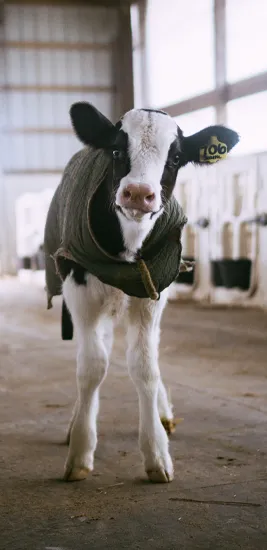

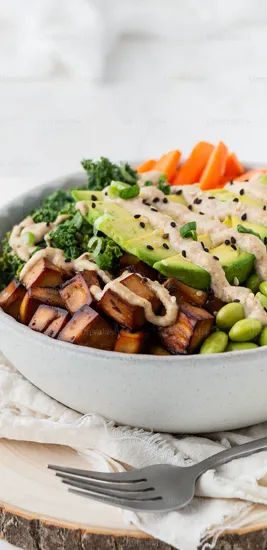
There are now almost 1,520,000 people in Germanywho live vegan - and the trend is rising exponentially!1 But what are the benefits of avoiding animal products in meals, clothing and cosmetics? Why are more and more people choosing to go vegan?
Of course, everyone has their own reasons! For example, documentation about the Factory Farming, a report on the causes of the Climate change or even an unexpected medical diagnosis such as type 2 diabetes.
Fundamental motives for being vegan
In my experience, however, at least one (but usually all) of the following is always the case in the end three overriding motives decisive:
Ethical motives (Moral)
Vegans have the Connection between their everyday behavior and violence against animals for our food, clothing, entertainment or scientific experiments. Tradition, convenience, habit and taste are no logical justification for them to continue exploiting and killing animals (and paying for it). Being vegan sends a clear signal for animal rights. (more at "vegan for ethical reasons")
But people are also vegan for other people - and not just for animals. For example, the vegan lifestyle can be used to reduce Displacement of indigenous peoples from rainforest regions who Exploitation of guest workers in slaughterhouses and even the World Hunger stop.
Ecological motives (Environment)
The production of animal products is extremely land- and resource-intensive (mainly due to the animal feed required) and therefore contributes massively to environmental problems such as global warming, climate change and climate change. Destruction of the rainforests and to the Drinking water shortage with. With the direct consumption of plants can therefore significantly reduce your personal ecological footprint.
Health motives (well-being)
Many people also choose a vegan lifestyle for health reasons. Among other things, because studies show that a balanced vegan diet can reduce the Reduce the risk of cardiovascular disease, type 2 diabetes and obesity can.2
In principle, however, the the satisfying feeling of no longer paying money for animal sufferingplay a decisive role in increasing well-being by switching to "vegan".
Tip: My personal Reasons for being veganI have explained them in detail in the linked article. If you are interested, please click here!
10 tips: How can I make my start in vegan life easier?
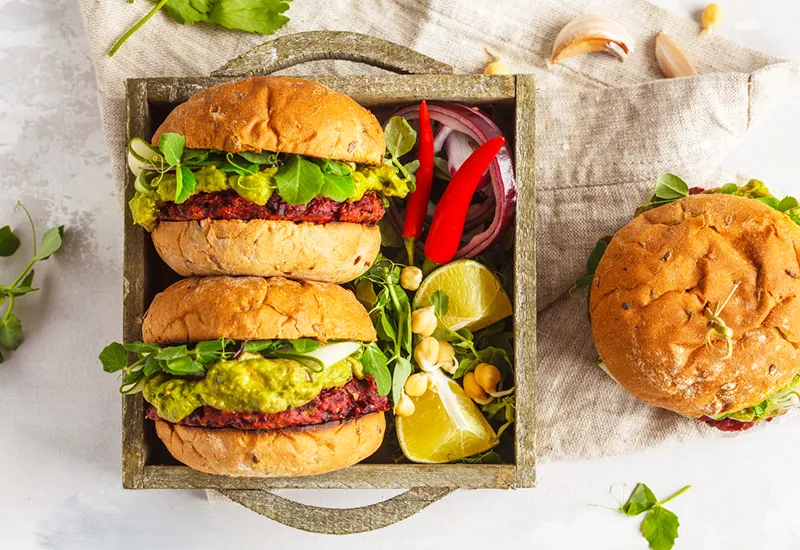
Motivated enough? Then I would like to help you now to Successfully mastering the transition to a happy, vegan life. Positive changes await you, especially in everyday areas such as shopping, cooking, health and leisure. Your quality of life is also guaranteed to improve as you become more of who you really are. (Keyword Cognitive dissonance -> Love animals, but eat them)
But please always be aware of this, that you don't have to do everything perfectly right from the start! Stay in difficult situations instead Flexible and eat something vegetarian as an exception rather than giving up completely and no longer be vegan.
Nevertheless, always be Open to new ideas and simply apply the following tips for a vegan lifestyle little by little um.
1. watch documentaries, read books and understand the vegan idea
The Veganism is by definition a A way of life that tries - as far as practicable - to avoid all forms of exploitation and cruelty to animals. If you keep reminding yourself of this, you will always be motivated to go vegan.
It also helps to help you with vegan documentaries (e.g. Cowspiracy or Dominion) to get a realistic picture of the animal suffering (i.e. the victims' perspective) that is caused every day in the production of meat, milk or cheese.
To make practical implementation in everyday life even easier for you and vegan prejudices (e.g. "vegan is unhealthy" or "vegan is expensive"), you should also read one or two books (e.g. Vegan is nonsense* or Eat animals*) read.
Maybe you even have vegans in your Circle of Friendswho are guaranteed to provide you with help and advice. Ultimately, the more you inform yourself, the more your attitude towards veganism will be strengthened.
2. cook fresh and with the help of cookbooks and vegan recipes
You'll make things much easier for yourself if you cook for yourself as often as possible. After all, you have the Full control over all ingredients! If you also eat fresh and healthy food, you too will feel good. feel fit and healthy. Iss slightly larger portionsas high-quality plant-based foods generally contain less fat than animal products.
If you are new to vegan cooking, make sure you get support from experienced chefs from the plant-based kitchen. One Additional pinch of motivation and inspiration you get, for example, with this great cookbook for vegan beginners*.
The internet is also full of valuable recipes for vegan dishes. For example, enter the words "vegan recipe for..." into your sustainable search engine and add your favorite dish. I know from my own experience that there is always a vegan, creative alternative!
Here are a few Recipes for a good, vegan start:
- Vegan scrambled eggs
- Vegan burger with black bean patty
- Pasta e Lenticchie
- Simple vegetable curry with rice
- Vegan moussaka
Book Tip: I would also like to take this opportunity to present our book "Cooking for the climate" where we have made a conscious decision to offer knowledge and recipes from climate-friendly, vegan cuisine. If you like, get it here*.
3. Prepare and inquire about vegan restaurants and options
As we all know, preparation is half the (vegan) battle! If you start the day well prepared, you are ultimately less susceptible to unhealthy or non-vegan temptations.
Cook a little more than usual in the evening, for exampleso that you have a meal ready for your lunch break the next day. (more under Vegan Meal Prep and Vegan on the job)
When starting out on a vegan diet, you may encounter one or two hurdles when visiting restaurants. Therefore, find out in advance if possible on the menu on the web about possible vegan dishes or options.
And if you get a little hungry in between, you should always a few nuts or dried fruit (e.g. dates) as a vegan snack have ready.
Tip: How I find something vegan in really every restaurantI will be happy to explain in the linked blog post.
4. use plant-based substitutes for meat, milk, cheese, etc.
When you've been eating meat, milk, butter, cheese and honey for years or even decades, it's often hard to kick the habit from one day to the next. Fortunately, there are Vegan substitute products for meat and Co! For example Soy schnitzel, burger patties made from pea protein or soy-based sausagesto make the change easier for you.
Also vegan Milk alternatives are available to you, for example, in the form of Almond, rice, oat, coconut or soy milk in abundance! Personally, I like oat milk best - it is also particularly resource-friendly.
Simply replace butter with Margarine or vegan butter from the supermarket. And instead of eating honey, I personally just soak it up Maple syrup, agave syrup or date syrup off.
Insider tip! Be sure to take a look at the vegan substitute products at Velivery* on! There you will find a suitable alternative for every animal product - for example vegan bockwurst*.
5. know critical nutrients in the vegan diet and their sources
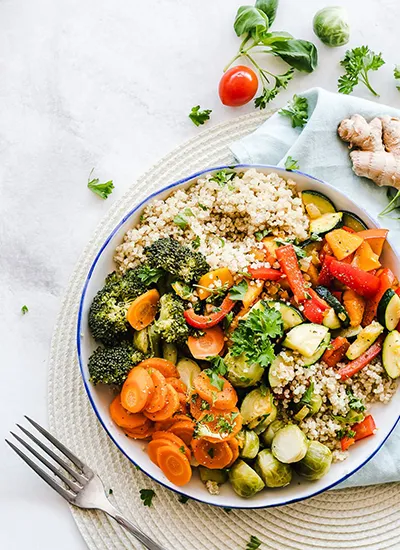
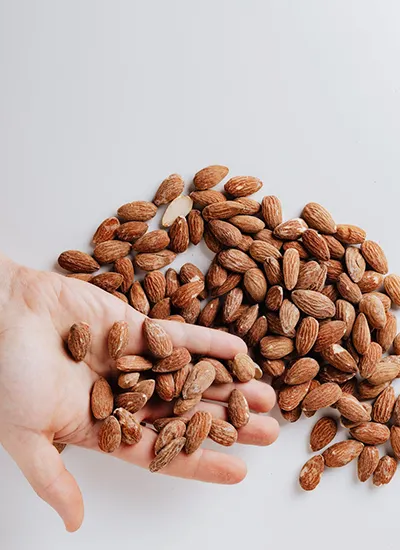
If you want to eat a vegan diet, you have to change your usual diet. Of course, as with any dietary change, there is the Risk of nutrient deficiency with health consequences.
The German Society for Nutrition but fortunately provides very good assistance. To the following critical substances you should pay particular attention to in a plant-based diet, according to the DGE. I have also added examples of suitable vegan sources to the list:
- Proteins (e.g. pumpkin seeds, chickpeas, beans, lentils, tofu and wholemeal pasta)
- Omega-3 fatty acids (e.g. chia seeds, linseed and walnuts)
- Vitamin D (sun rays, but also mushrooms, chanterelles and shitakes, for example)
- Iron (e.g. lentils, soybeans, quinoa, hazelnuts and oatmeal)
- Selenium (e.g. Brazil nuts, porcini mushrooms, chickpeas and oat flakes)
- Iodine (e.g. iodized salt or seaweed)
- Calcium (e.g. kale, spinach, rocket, broccoli and almonds)
- Zinc (e.g. pecan nuts, pumpkin seeds, wheat germ, oat flakes and sesame seeds)
- Vitamin B2 (e.g. mushrooms, yeast flakes, tempeh and soybeans)
- Vitamin B12 (about taking a Vitamin B12 preparation*)
Some people also find it difficult to feel full at first when switching to a vegan diet. A high-fiber diet will help you here, as Dietary fiber filling have an effect. They are found exclusively in plant-based foods. For example, cereals, pulses, nuts and nuts are particularly rich in fiber. Fruit and vegetables.
6. regularly in the initial phase Blood count have it created
All die-hard vegans know this: you are Visiting grandma and grandpa or at a family party and are asked directly, whether veganism is healthy at all and whether you already have a nutrient deficiency.
The easiest way to reassure your family (and yourself) is with regular blood work with your family doctor. This allows you to determine whether you are consuming sufficient amounts of the critical (or all) nutrients. I've been doing this twice a year for many years now - and I've never had a nutrient deficiency.
7. Look for ingredients and vegan labels
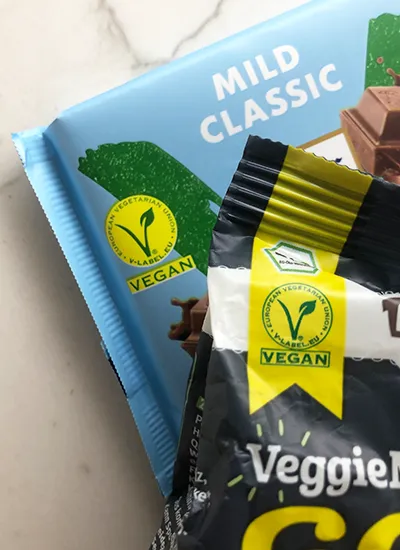
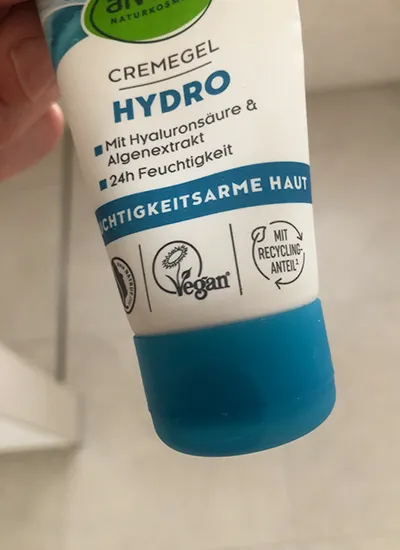
The List of ingredients of foodstuffs and cosmetics or the material on the Care label of clothing can be a little confusing under certain circumstances. Another important "vegan tip" is therefore to look for trustworthy labels and seals.
Above all, the famous V-Label for vegan foods that Vegan flower for vegan natural cosmetics or the PETA-Approved Vegan Seal for animal-free clothing will help you!
The hint "May contain traces of milk (etc.)" is purely an indication for allergy sufferers. As a rule, the product does not contain any milk - however, minimal amounts of milk may be mixed into the product during the production process. If the list of ingredients is otherwise purely vegan, the product is also vegan. As long as you are not lactose intolerant, you can buy the product without hesitation.
In the end, it is even a useful hint that there are definitely no dairy products in the product by default.
Important: Please don't throw away old leather shoes just because they're not vegan! Instead, just use them until they break - and only then replace them with a vegan alternative.
8. know surprisingly non-vegan foods and things
Most products are self-explanatory vegan! But there are some Non-vegan stumbling blocksthat you will come across sooner or later. It's better to simply know them already.
Here I therefore present some Surprisingly often non-vegan food and also Items before:
- Condoms (Milk protein casein is often used in production)
- Brush (are often made with animal hair)
- Shampoos (sometimes contain animal additives such as gelatine or cholesterol)
- Silk (consists of the caterpillar cocoons of the silkworm moth)
- Chips (some manufacturers use rennet from veal, for example)
- Gummy bears (often contain animal gelatine)
- Wine (sometimes clarified with gelatine, casein or the swim bladder of the sturgeon)
But there are also vegan alternatives for all these thingsso don't worry. Nevertheless, it is of course advantageous to learn from the "mistakes" of other vegans from the very beginning of a vegan lifestyle.
Important: Again, veganism is not about doing everything perfectly! It's more about learning and getting better bit by bit 🙂
9. Use vegan apps and sound knowledge from the internet
There are a few, Practical aidsthat can make your vegan life much easier! For example, use the PETA shopping guideto see directly which items are vegan and in which (supermarkets) you can get them.
Another shopping aid is the App CodeCheck. You simply scan the barcode of a product and see directly whether it contains non-vegan ingredients.
I can also highly recommend the Happy Cow" app! It helps you all over the world to be completely Quickly find vegan restaurants near you - or businesses that offer vegan options.
If you like big, personal Changes tend to be difficult fall, then I can also advise you to get a accompanying online course to look for. My absolute recommendation in this respect is the Course "Going vegan made easy" by ISSHAPPY*.
10. be a positive vegan role model and actively stand up for animals
You live vegan for the animals, for the environment and for your health - these are three things Motifs worth imitatingwhich presumably (almost) everyone views positively!
Accordingly, you can also go one step furtherspread the message and stand up for animal rights.
If you live a vegan lifestyle and want to be fit, healthy and Full of energy you also walk like a walking billboard for veganism through the area. That is already a good basis for promising, objective discussions.
Also be respectful and open to other opinions. In the end, you will achieve much more than if you have heated conversations with a raised index finger.
Tip: How you Convince meat eaters better without being intrusive, I will be happy to explain in the linked blog article!
FAQ: What are the most frequently asked questions about the vegan diet and lifestyle?
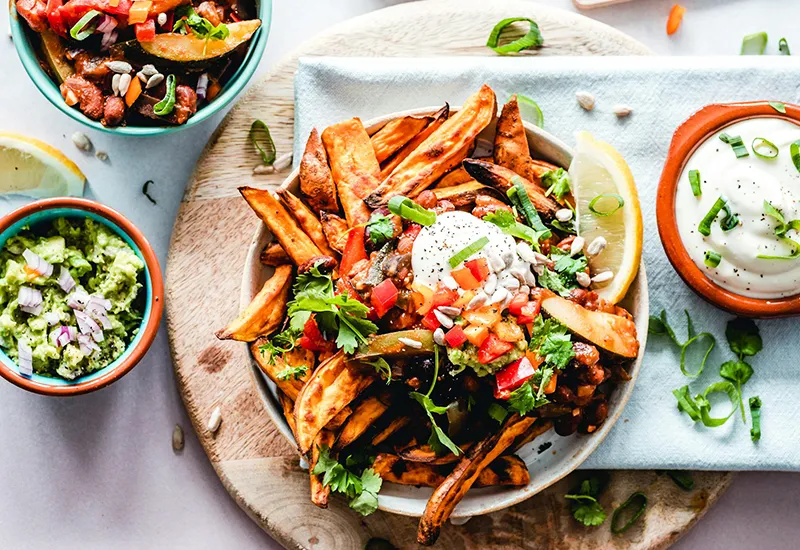
In some situations, new vegans have a lot of question marks buzzing through their heads. To help you save a lot of research work and to improve your knowledge of the vegan lifestyle, I have listed some of the most frequently asked questions about the vegan lifestyle and answered them briefly and concisely.
What can I still eat as a vegan?
As a vegan, you can basically eat everything that non-vegans eat! For example, I still eat Burgers, pasta, pizza and grilled steaks - only in vegan form without animal suffering.
Is a vegan diet healthy?
According to the American Dietetic Associationthe world's largest organization of more than 70,000 nutrition professionals, researchers and physicians, is a balanced planned vegan diet healthy - for all phases of life.
According to the study, vegans even have a significantly lower risk of developing nutritional diseases, like Heart disease, type 2 diabetes, cancer, osteoporosis, obesity or Hypertension to fall ill.
To eat a healthy vegan diet, you can follow the vegan food pyramid orientation. Above all, it emphasizes the importance of sufficient quantities of fruit and vegetables, wholegrain products, pulses, nuts, seeds and oils. This healthy basis is supplemented by rather small amounts of dairy and meat alternatives as well as junk food.
Always be aware that you can also live an unhealthy vegan lifestyle! After all Coke, Fanta and potato chips usually also vegan - and anything but healthy.
How can I replace eggs?
You can use eggs in the vegan kitchen diverse replace! I have given you here briefly and concisely the most important plant-based egg alternatives compiled:
- Strength (e.g. potato starch) as a binding agent and for thickening.
- Applesauce, Oatmeal or ripe banana as a binding agent.
- Locust bean gum for thickening.
- Kala Namak salt to imitate the typical taste and smell of eggs.
- Vinegar & baking soda for loosening the dough.
Isn't it enough to be vegetarian?
Unfortunately, animals also suffer in the brutal dairy industry - and will eventually also processed into meatas soon as they stop giving milk. Chickens also have to suffer and die as soon as they are inefficient and no longer lay eggs.
In addition, the industries are still Extremely resource intensive and environmentally harmful - and there are also much healthier, plant-based alternatives for their products.
So if you are vegetarian and do not eat meat products, to really stop animal suffering or to really protect the environment and their healthyou'd better go vegan. Because Being vegatarian is not enough.
Vegan living, made easy!
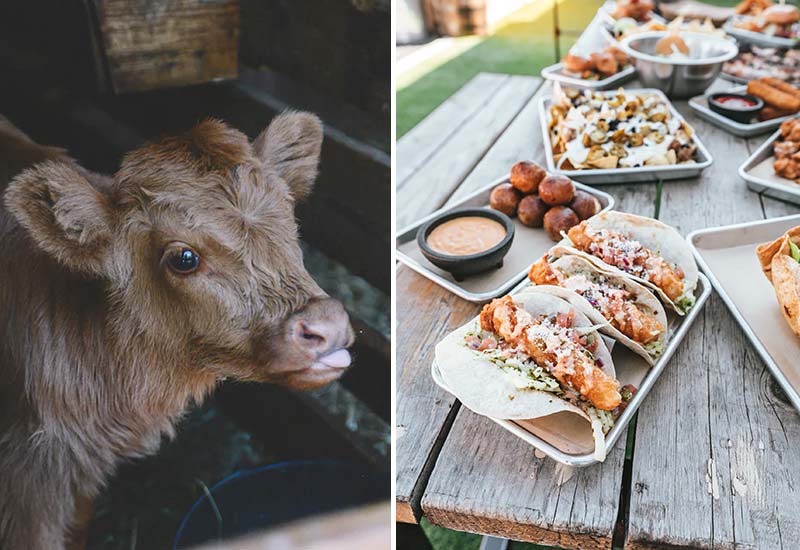
Nowadays it is no longer difficult to live vegan! And you can overcome the few remaining hurdles with the many useful tips you have learned today. They should help you Make it much easier to start a plant-based diet and vegan lifestyle. Just try to implement them bit by bit and constantly expand your knowledge.
At this point, however, it should also be said once again that it is extremely It is important that you do not demand too much of yourself. Because a healthy, vegan diet and lifestyle is a personal change process that (usually) takes some time.
It might also help you if you can connect it to a vegan trial month (like the Veganuary) or accompanied by the Online course "Going vegan made easy "* triggers. Just do what feels right for you.
"The world is not an inferior product, and animals are not a fabrication for our use."
Arthur Schopenhauer (more at Animal Welfare Quotes)
Do you have any questions, suggestions or further tips for vegan beginners? Then please write a comment below this post.
Stay animal-friendly, sustainable and healthy,

PS: The decision, Unfortunately, going vegan can also be a recurring topic of controversy. be The best way to communicate with family and friendswithout causing trouble, I will explain to you next in the linked blog post.
References
- IfD Allensbach (2023): People in Germany who classify themselves as vegans or as people who largely abstain from animal products in the years 2015 to 2023, available at https://de.statista.com/statistik/daten/studie/445155/umfrage/umfrage-in-deutschland-zur-anzahl-der-veganer. [19.01.2024]. ↩︎
- American Dietetic Association; W. J. Craig; A. R. Mangels: Position of the American Dietetic Association: vegetarian diets (as of July 2009), https://pubmed.ncbi.nlm.nih.gov/19562864. [19.01.2024]. ↩︎

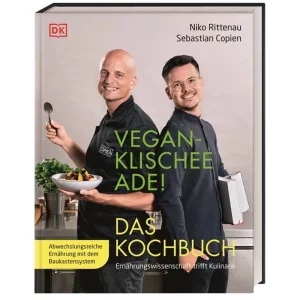

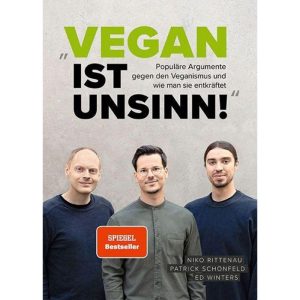

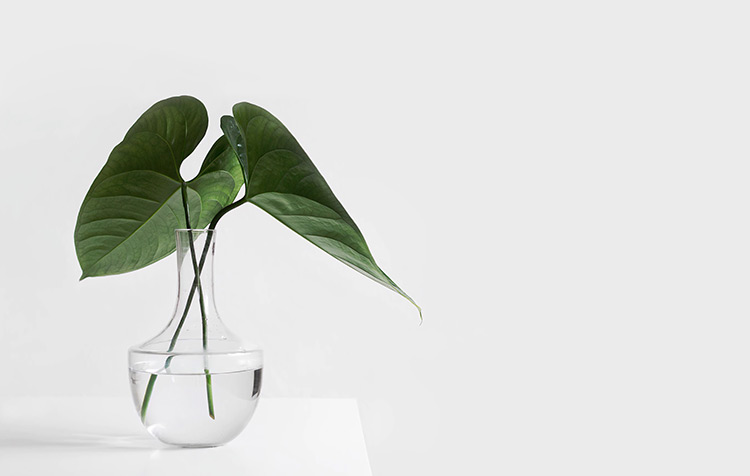
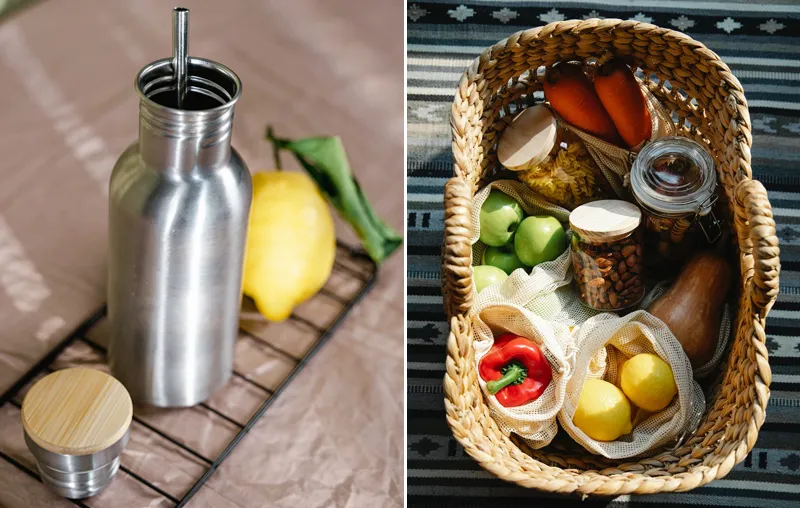

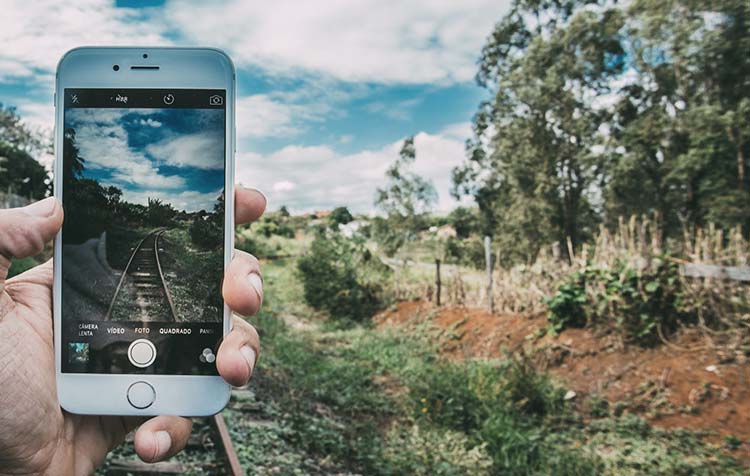
Interesting that chia seeds can be good for covering the protein needs. I'm also thinking about integrating vegan cuisine into my life more often. Maybe I'll look for a few recipes from the Internet to bring a little more variety into it.
Hello Manuela, thank you for your comment. Among other things, bee mortality occurs because we destroy plants, seal the soil, pollute the air and use masses of pesticides in industrial agriculture. Among other things, to grow animal feed. And now you would rather continue to eat meat to save the bees?
The more plant-based food is grown, the more bees have a food source. The calculation is actually quite simple 🙂
Best regards,
Christoph
Hello,Julian, my husband and I have been doing the same for a yellow year. Vegan nutrition is a huge enrichment!
We live in a rural small town in the Allgäu....essen go shopping and lifestyle are not yet fully adjusted to vegan, but Biokiste, natural market and passionate self-cooking are a prima alternative.
Even economically it has already proved positive, we got a larger repayment of utilities. Sorry to be so blunt now...however...less body odor....less showering.....less laundry....less personal care products....usw...
I am very grateful that through an impulse of my husband we became vegans overnight and can now finally implement what we "always" knew and carried within us.
I do not want to proselytize.....4 weeks to try is free to everyone :))))
Beautiful blog, thank you and V ielen Grüsse....Andrea Sterntaler.
Hello Andrea,
Thank you so much for your lovely comment.
I can only agree with you that the vegan life is an absolute enrichment, both physically and mentally. In particular, I can only confirm that with the body odor. I was totally surprised when I noticed that you smell much less. If you think about it, however, it is logical: the body exhales what we eat.
Missionizing is often the wrong way, because the other person is then put on the defensive. I always try to inform my fellow human beings so that they can then make their own decisions and reflect. And simply trying out a vegan diet for four weeks is certainly the best way to get to grips with the subject and experience the positive effects.
Love greetings
Julian